Text this colour is a link for Members only. Support us by becoming a Member for only £3 a month by joining our 'Buy Me A Coffee page'; Membership gives you access to all content and removes ads.
Text this colour links to Pages. Text this colour links to Family Trees. Place the mouse over images to see a larger image. Click on paintings to see the painter's Biography Page. Mouse over links for a preview. Move the mouse off the painting or link to close the popup.
Rose Castle, Dalston is in Dalston, Cumberland, Castles in Cumberland.
Rose Castle, Dalston [Map] was the residence of the bishops of Carlisle from 1230 to 2009.
Chronicle of Walter of Guisborough. After receiving these apostolic letters, the King convened a council at Lincoln1, and after due deliberation, he gave the following reply:
"The Most High2, the Inspector of hearts, knows, inscribed in the indelible script of our memory's archive, that our ancestors and forefathers, the kings of England, have from the most ancient times held superior and direct dominion over the kingdom of Scotland and its kings in temporal matters and their dependencies; and from those kings of Scotland, and from the nobles of that kingdom from whom they wished to receive it, they obtained lawful homage and oaths of fealty for the kingdom of Scotland. We, continuing in possession of this right and lordship in our own time, have likewise received the same homage and fealty from both the King of Scotland and the nobles of the realm. Nay more, such was the prerogative of right and dominion that our ancestors enjoyed over the kingdom of Scotland and its kings, that they would bestow that kingdom upon their loyal subjects; and even remove kings for just causes, and appoint others in their place to reign under them. These facts are undoubtedly held to have been known and acknowledged by all, though perhaps something else, falsely insinuated through deception by enemies of peace and sons of rebellion, may have been suggested to your paternal ears. We humbly pray that your Holiness may turn your eye away from their scheming and imaginary fabrications. And we devoutly entreat your paternal excellence that, keeping the deeds of former times intact for the sake of brevity, we may be permitted to mention a few things by way of example."3
Rex acceptis hujusmodi literis apostolicis, convocavit concilium Lincolniæ, et, deliberato consilio, respondit sic:
Altissimus, Inspector cordium, nostræ scrinio memoriæ indelebili stilo novit inscribi, quod antecessores et progenitores nostri, reges Angliæ, jure superiori et directo dominio ab antiquissimis retro temporibus regno Scotia et ipsius regibus in temporalibus et annexis eisdem præfuerunt, et ab eisdem regibus pro regno Scotiæ, et ejusdem regni proceribus a quibus habere volebant, legalia homagia et fidelitatis juramenta receperunt. Nos, juris et dominii possessionem continuantes hujuswards reply. modi, pro tempore nostro, eadem tam a rege Scotiæ quam ab ipsis regni proceribus recepimus. Quinimmo tanta juris et dominii prærogativa super regnum Scotia et ejusdem regem gaudebant, quod regnum ipsum fidelibus suis conferebant; reges etiam ex causis justis amovebant, et constituerunt sub se loco ipsorum alios regnaturos. Quæ proculdubio notoria fuisse et esse creduntur apud omnes, licet aliud forsan paternis auribus per pacis æmulos et rebellionis filios fuerit falsa insinuatione suggestum; a quorum machinosis et imaginariis figmentis ut vestræ sanctitatis oculus avertatur suppliciter quæsumus; et paternam excellentiam devotis affectibus exoramus, ut, brevitatis causa gestis anteriorum temporum salvis, quædam exempli causa tangamus.
Note 1. The writs of summons for the meeting of this parliament are dated at Rose Castle, Cumberland [Map], on the 26th of September, 1300. The King at the same time sent orders to the different monasteries to search their chronicles, and transmit to him whatever they could discover relative to the Scottish kingdom. He also directed the chancellors of the Universities of Oxford and Cambridge to send four or five doctors in the common law to consult on the Scottish succession. Rymer, Fœdera, 1.923, 924. The evidence thus collected was embodied in a letter to the Pope, drawn up, it appears, by Rishanger; which letter, we find from an entry in Bishop Stapleton's Kalendar, though intended to be sent, was never actually dispatched. Vide Documents and Records illustrating the History of Scotland, i. Introd. CXXX, by Sir F. Palgrave. The copy of this document preserved by Guisborough differs considerably from the enrolment extant on the Rot. Claus, 29 Edward I m, 10, dorso, in the Tower of London. As there seems some probability that the enrolment was made from an earlier draught of the letter, it has been thought advisable to print the text of the document from the MSS. of Guisborough, with the variations of the enrolment as notes.
Note 2. To the Most Holy Father in Christ, Lord Boniface, by divine providence Supreme Pontiff of the Holy Roman and Universal Church, Edward, by the same grace, King of England, Lord of Ireland, and Duke of Aquitaine, devout kisses of the blessed feet. The following we submit not in the form or guise of a legal judgment, but entirely outside the context of litigation, for the purpose of calming the conscience of your holy paternity. May the Most High,..." etc. Rot. Claus.
Note 3. In place of this passage, the enrolment has the following: These things, without a doubt, were known and are acknowledged from ancient times, although perhaps something different may have been falsely insinuated to Your Paternal Ears by the enemies of peace and sons of rebellion. May your providence, we beseech you, reject their scheming and imaginary fabrications. Now, in the time of Eli and the prophet Samuel, there was a certain brave and distinguished man named Brutus, of Trojan descent, who, after the destruction of the city of Troy, arrived with many Trojan nobles in a certain island then called Albion, which was inhabited by giants. Having overcome and slain them by his own power and that of his followers, he named the island 'Britain' after himself, and his companions he called 'Britons'. He also built a city, which he named Trinovantum, now called London. Later, he divided his kingdom among his three sons: to Locrinus, the eldest, he gave that part of Britain which is now called England; to Albanactus, the second-born, he gave the part that was then called Albania from the name of Albanactus, and is now called Scotland; and to Camber, the youngest, he gave the part then named Cambria after himself, now known as Wales, while reserving royal dignity for Locrinus as the eldest. Then, two years after Brutus's death, a certain king of the Huns named Humber arrived in Albania and killed Albanactus, brother of Locrinus. When Locrinus, King of the Britons, heard this, he pursued Humber, who, fleeing, drowned in a river which was thereafter named Humber after him. And thus, Albania reverted to the aforementioned Locrinus. Likewise, Dunwallo, King of the Britons, killed Stater, King of Scotland, who had rebelled against him, and received his land in submission. Also, the two sons of Dunwallo, Belinus and Brennius, divided their father's kingdom between them, in such a way that Belinus, the elder, held the crown of the island with Britain, Wales, and Cornwall; and Brennius, to reign under him, received Scotland, for Trojan custom required that the right of inheritance should fall to the eldest son. Likewise, Arthur, the most famous Prince and King of the Britons, subjugated Scotland, which had rebelled against him, and almost completely destroyed its people. Later, he appointed a certain man named Anguselus as King of Scotland. And afterward, when King Arthur celebrated a most splendid feast at the city of Legions [Caerleon, Gwent] all the kings subject to him were present there, among whom was Anguselus, King of Scotland, who, rendering the service owed for the kingdom of Scotland, carried King Arthur's sword before him. And so, in succession, all kings of Scotland were subject to all kings of the Britons. But when the English kings later came to power in the said island and obtained its monarchy and dominion, then thereafter Edward...
Quæ proculdubio ab antiquo notoria fuerunt et existunt, licet aliud forte paternis auribus per pacis æmulos et rebellionis filios fuerit falsa insinuatione suggestum; quorum machinosa et imaginaria figmenta vestra providentia quæsumus aspernetur. Sub temporibus itaque Ely et Samuelis prophetæ vir quidam strenuus et insignis Brutus nomine, de genere Trojanorum, post excidium urbis Trojæ cum multis nobilibus Trojanorum applicuit in quandam insulam tunc Albion vocatam, a gigantibus inhabitatam, quibus sua et suorum devictis potentia et occisis, eam nomine suo Britanniam sociosque suos Britones appellavit, Et ædificavit civitatem quam Trinovantum nuncupavit, qua modo Londonia nominatur. Et postea regnum suum tribus filiis suis divisit, scilicet Locrino primogenito illam partem Britanniæ quæ nunc Anglia dicitur; et Albanacto secundo natu illam partem que tunc Albania a nomine Albanacti, nunc vero Scotia nuncupatur; et Cambro filio minori partem illam nomine suo tunc Cambria vocatam, quæ nunc Wallia vocitatur; reservata Locrino seniori regia dignitate. Itaque biennio post mortem Bruti applicuit in Albaniam quidam rex Hunorum nomine Humber; et Albanactum fratrem Locrini occidit. Quo audito Locrinus rex Britonum persecutus est eum. Qui fugiens submersus est in flumine, quod de nomine suo Humber vocatur, Et sic Albania revertitur ad dictum Locrinum. Item Dunwallo rex Britonum Staterium regem Scotia sibi rebellem occidit, et terram ejus in deditionem recepit. Item duo filii Dunwallonis scilicet Belinus et Brennius inter se regnum patris sui diviserunt, ita quod Belinus senior diadema insula cum Britannia, Wallia, et Cornubia possideret. Brennius vero sub eo regnaturus Scotiam acciperet; petebat enim Trojana consuetudo ut dignitas hæreditatis primogenito proveniret. Item Arturus rex Britonum princeps famosissimus Scotiam sibi rebellem subjecit et pene totam gentem delevit. Et postea quendam nomine Anguselum inregem Scotiæ præfecit. Et cum postea idem rex Arturus apud civitatem Legionum festum faceret celeberrimum, interfuerunt ibidem omnes reges sibi subjecti, inter quos Anguselus rex Scotiæ servitium pro regno Scotiæ exhibens debitum, gladium regis Arturi detulit ante ipsum. Et successive omnes reges Scotiæ omnibus regibus Britonum fuere subjecti. Succedentibus autem regibus Anglis in prædicta insula, et ipsius monarchiam et dominium obtinentibus, subsequenter Edwardus, etc.
"Sanctissimo in Christo patri domino B, divina providentia sanctæ Romanæ ac universalis ecclesiæ summo pontifici, Edwardus ejusdem gratia rex Angliæ, dominus Hiberniæ, et dux Aquitaniæ, devota pedum oscula beatorum. Infrascripta non in forma nec in figura judicii, sed omnino extra judicium, pro serenanda sanctæ paternitatis vestre conscientia vobis transmittimus exhibenda. Altissimus," etc. Rot. Claus.
![]() Become a Member via our 'Buy Me a Coffee' page to read complete text.
Become a Member via our 'Buy Me a Coffee' page to read complete text.
On 1st October 1869 Bishop Samuel Waldegrave (age 50) died at his residence Rose Castle, Dalston [Map], Cumberland. Monument in Carlisle Cathedral [Map] sculpted by John Adams Acton (age 38).
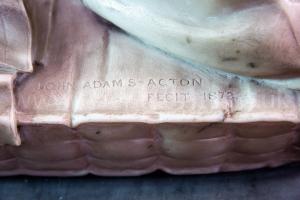
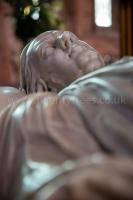
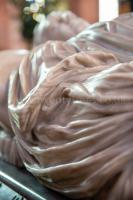
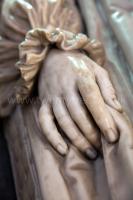
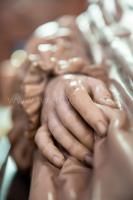
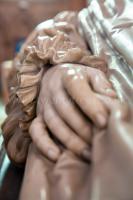
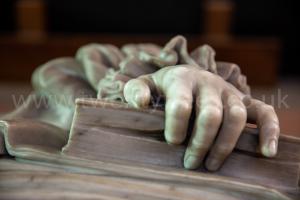
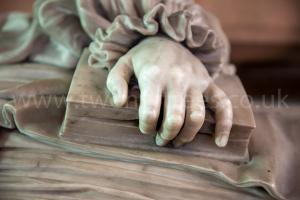
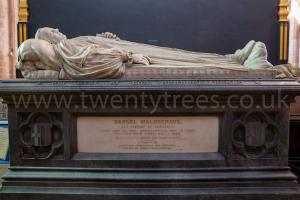
Bishop Samuel Waldegrave: On 13th September 1819 he was born to William Waldegrave 8th Earl Waldegrave in Cardington, Bedfordshire. In 1860 he was appointed Bishop of Carlisle.